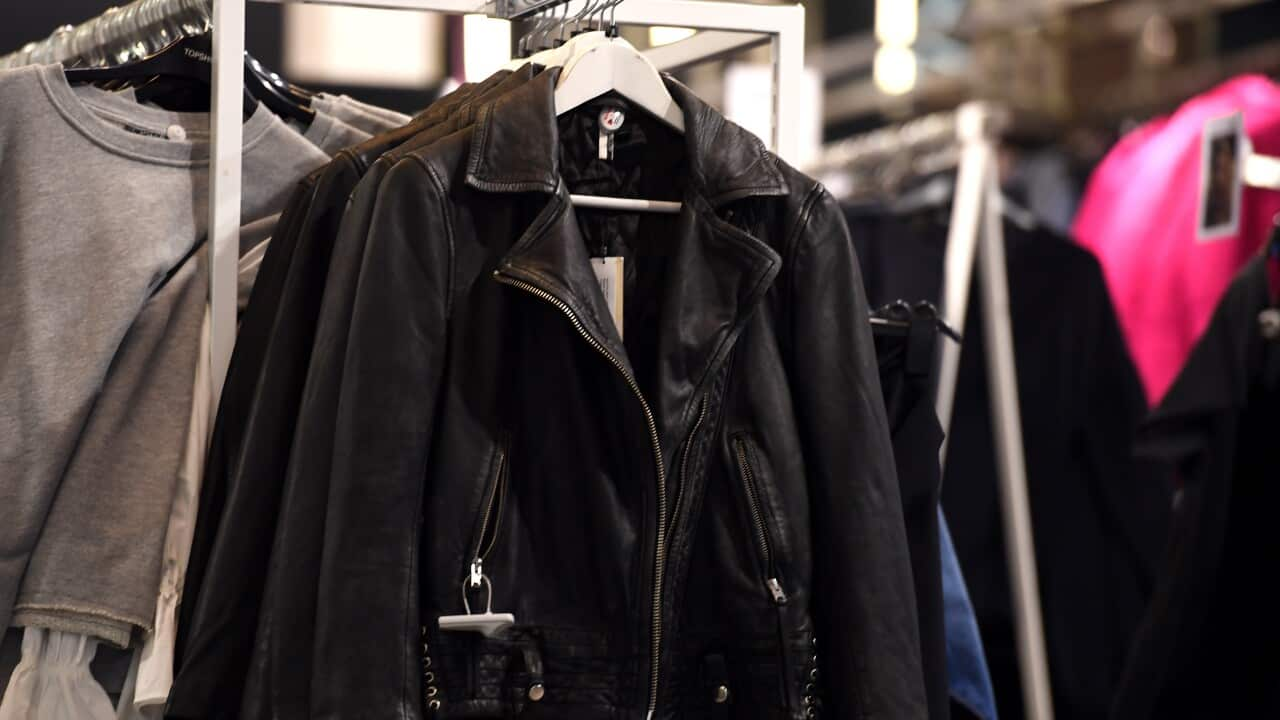At a warehouse northwest of Sydney, mounds of discarded uniforms are being sorted by a volunteer.
They were collected by a small business with a big goal, to reduce the 200,000 tonnes of unwanted clothing sent to landfill each year.
"My job today was sorting the clothes and separating white and coloured clothing," says Lily Watt, 18.
"Recycling is so important, and I am very passionate about not contributing to landfill because the environment is a big concern that’s close to my heart."

Volunteer Lily Watt sorting discarded uniforms at the Worn Up warehouse. Source: SBS / Sandra Fulloon
"Being the youngest child, my older siblings handed theirs down to me. I didn't know what to do with my uniforms when I left school, but then I found out about this process, and so I donated them."
Lily’s uniforms are among thousands received by a small family business called Worn Up. Its focus is recycling fabric and turning it into useable items like school furniture.

Discarded school uniforms ready for recycling. Source: SBS / Spencer Austad
"Australia has four million school students and most of them wear uniforms," says Thompson, 64.
"Each student wears around 10 kilos of uniforms, over a 12-to-24 month period. The volume of waste is incredible. And we get five or six calls from schools across Australia every day."
Thompson is in her second year of a master’s degree in sustainable development at Macquarie University and is passionate about creating change around textile waste.
With her husband Fuller, an architect, she started Worn Up in 2020, while also running a school clothing venture.
"Uniforms have become our passion. Our original business was supplying and distributing sustainable school uniforms," says Fuller.
"Then we decided that we wanted to take them back and recycle them," he says.
"We want to extract value and the embodied energy that's been used in making uniforms and turn that into something useful," Thompson adds.

Uniforms are shredded into fine fibres ready for processing. Source: SBS / Spencer Austad
Thompson says the boards can be shaped into desktops, chairs and even cutting boards.
"Clothing is notoriously hard to upcycle. We like uniforms because most are made from predictable fibres, like polyester which is synthetic. That means it takes 100 years to break down in landfill.
"For FABtec we actually prefer synthetic fibres because if they are strong enough to last for 100 years in landfill, they’re strong enough for a child's desk."

FABtec boards and demonstration products at the warehouse. Source: SBS / Spencer Austad
Australia makes and imports 1.4 billion units of new clothing annually — that's more than 370,000 tonnes.
"Textile waste is a huge issue. Most of the imported garments end up in landfill and only one-quarter of the textile waste is recycled because we don't have the infrastructure in Australia yet," Thompson says.
"It's really upsetting because there's so much that we can do with these materials."
It's one reason Worn Up has partnered with the national science organisation, the CSIRO, through its Kick Start program.

Worn Up co-founder Annie Thompson (left) and CSIRO's Megan Sebben. Source: SBS / Sandra Fulloon
"CSIRO has a real commitment to initiatives around ending plastic waste which we have identified it as being a very serious global challenge," says Kick Start program manager Dr Megan Sebben.
"For us, collaborating with companies like Worn Up is a good opportunity to address this in a number of different ways, including industry applications to end this huge problem that we have."
Thompson says the CSIRO collaboration gave Worn Up access to global experts who then became mentors.

The CSIRO's Megan Sebben says the agency has identified plastic waste as a "serious global challenge". Source: SBS / Spencer Austad
"As we are dealing with high volumes of textile waste, it is really important that we have a high-value and high-volume solution," says Thompson.
Sebben says the CSIRO assessment found FABtec to be "innovative" and "robust".

Demonstration items made from FABtec. Source: SBS / Sandra Fulloon
"This product is novel and it addresses quite a serious problem that we have in sustainability and circular economy that's not often talked about in comparison to other plastics and pollutants," she says.
Worn Up is currently in talks with commercial furniture manufacturers and plans to approach state governments about placing desks in schools.

Worn Up co-founder Annie Thompson. Source: SBS / Spencer Austad
"Initiatives like Worn Up are fantastic for keeping materials in use, but us as individuals, what else can we do?
"We have 1.4 billion units of new clothing manufactured or imported into Australia each year, most of which are non-sustainable, non-durable materials.
"And 200,000 tonnes of clothing, not textiles, but clothing, goes to landfill in Australia each year."

Phases of the FABtec process from fabric to furniture. Source: SBS / Sandra Fulloon
Worn Up is among several innovative Australian ventures working to recycle textile waste. Thompson hopes FABtec may have broader applications worldwide.
“We would really love to see FABtec go global. As a global first, made-in-Australia concept, it would be fantastic for us to see this become the norm everywhere," Thompson says.

Worn Up co-founder Murray Fuller (left) with daughter Amelia (centre), son Taylor, and Annie Thompson. Source: Supplied / Annie Thompson
"And we've got a few orders from that. We're on the path to commercialisation eventually.
"Can you imagine if every student in Australia or all four million of them sat at a desk made from their uniforms? That's where we are headed."












